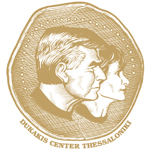Dukakis Center welcomes French journalist

"This is my first visit to Thessaloniki. I am struck by the traces of French presence in the city.”
-- Jean Quatremer
The Dukakis Center hosted the distinguished French journalist Jean Quatremer for a Dukakis Lecture on Friday, November 20, at the Municipality of Thessaloniki. The event was co-sponsored by the French Institute of Thessaloniki and the Journalist's Union of Macedonia-Thrace, with further support from the Consulate-General of France in Thessaloniki and TV100.
The event began with the observation of a minute of silence in memory of the victims of terrorist attacks in Kenya, Beirut, Paris, and, on the very day of the event, Mali, and an elegant homage in Greek by Consul-General Christophe Le Rigoleur.
M Quatremer followed up on this theme in an initial exchange with Filios Stangos, Director-General of TV100, who moderated the event in the form of an extended interview. What are the potential pitfalls of our gut reactions to the Paris terrorist attacks and the ongoing refugee crisis? What do we prioritize, stability or security? Should we fear the rise of the extreme right? What can Greece do?
Coming next to Greece, the main subject of his lecture, and of his recent documentary for ARTE on the Greek referendum of July 2015, Quatremer elaborated an argument according to which Greece is a nation but not a functional state. “In Europe people are asking, is the Greek state serious?" This allows us to understand the various reactions of Greece's partners in the EU and the eurozone.
Explaining the apparent lack of trust expressed by other members of the eurozone, Quatremer proposed that Greek leaders never learned to coexist in the gentlemen's club of European statesmanship, according to which one does not question the word of a fellow leader -- one's word should be one's bond.
While resisting the temptation to tell the audience what Greece -- and her partners --should do, Quatremer did offer two thoughts. First, to conclude his discussion, he repeated a thought he has expressed more than once in his blog in the French daily Libération: regardless of one’s personal political preferences, we must hope that Prime Minister Tsipras is successful, that he brings about the modernization of the Greek state.
The European Union has a problematic role to play in this process. However, athough the EU must “continue to pressure Greece to undertake necessary reforms... the international community does not have the capacity to rebuild the Greek state.” Greece cannot be expected to pay back the loans it has received since 2010.
Second, more privately, he revealed that his role as journalist is to disturb people, to say things that others might refrain from saying. He has spoken publicly in Greece on occasion since 2011, and the response of Greek auditors to his critique of the dysfunctionalities of the Greek state is often one of appreciation, as if to say that he had articulated things people think and know to be true with a voice of truth and authority. "Each time that I dialog with Greeks they have reacted well -- people like to hear the truth."
What can be done? The problems can be fixed, Jean Quatremer says, even as he insists that “it is not the Greeks he meets in the street who are responsible for the problems of the Greek state.”